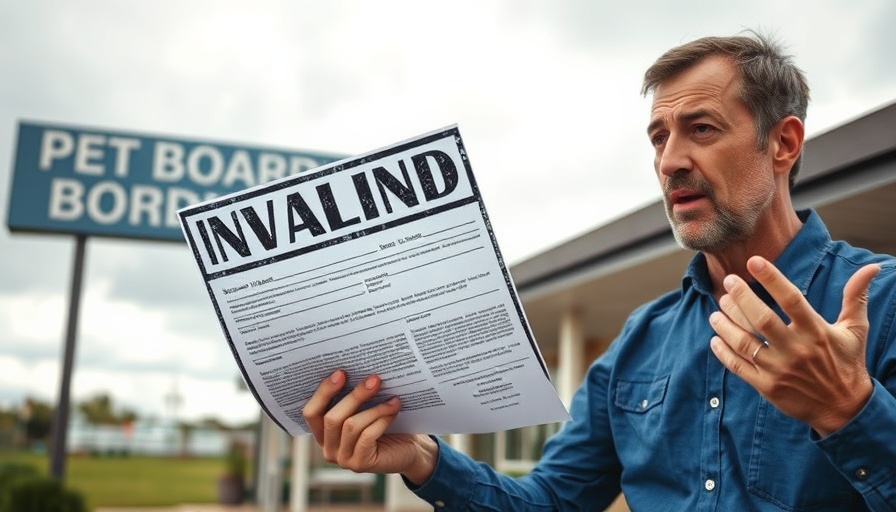
Understanding the Consequences of Animal Care Violations
In a troubling case that has recently unfolded in Windcrest, Texas, the owner of Texas Canine Boarding & Pet Services, Corey Jones, was stripped of his commercial boarding permit. This action was taken by Animal Care Services (ACS) following allegations that he engaged in unauthorized veterinary practices, specifically performing artificial insemination on dogs without a license. While the facility is now without a permit, the decision not to pursue felony animal cruelty charges against Jones raises significant questions about accountability and the enforcement of animal welfare laws.
The Legal Landscape of Animal Care Services
Animal Care Services' conclusion not to pursue charges stems from extensive consultations with state agencies, including the Bexar County District Attorney’s office and the Texas Veterinary Medical Association. According to an ACS spokesperson, they explored every avenue before making their decision, which has since spurred debate among animal welfare advocates in San Antonio. Critics express concerns that the lack of criminal charges allows potential offenders to escape legal repercussions for compromising animal welfare.
The Role of Social Media in Animal Welfare
In a revealing turn of events, a TikTok video surfaced showcasing the controversial services offered at Jones' facility, including transcervical insemination and ultrasounds—procedures reserved for licensed veterinarians under Texas law. This digital revelation underscores the necessity of transparency in animal care businesses and the role of social media in holding individuals accountable. Advocates argue that immediate exposure through platforms like TikTok can initiate vital discussions about animal safety and ethics.
Animal Care and Community Trust
The suspension of Texas Canine's commercial permit affects not only the business and its clientele but also the broader community's trust in animal welfare services. Pet owners rely on licensed facilities to ensure the health and safety of their animals, and violations can shake the community’s faith in regulatory bodies. This case further emphasizes the importance of strong oversight and enforcement measures to protect public interests in animal services.
What Lies Ahead for Animal Rehabilitation and Support?
As this situation unfolds, the future of animal care revisits essential questions about ethical practices and community engagement in enforcement. The Texas Board of Veterinary Medical Examiners, which now has a formal complaint against Jones, will influence outcomes pertaining to licensed versus unlicensed practitioners. The case could signal a pivotal moment for legislative review and strengthen veterinary oversight protocols, hopefully ensuring improved standards for animal care in Texas.
Your Takeaway: The Importance of Vigilance in Pet Care
This incident serves as a reminder to pet owners to remain vigilant when selecting care services for their animals. Understanding the qualifications of service providers can significantly impact your pet's well-being. As the situation continues to develop in the community, staying informed about local animal care policies can empower residents to advocate for better practices.
Join the Conversation
Pet owners and concerned citizens are encouraged to speak out about animal welfare issues and demand actionable policies that protect the entities involved. Engaging with local government and supporting community initiatives can create a ripple effect that helps shape a safer environment for animals. Follow local news updates to remain informed about ongoing discussions regarding animal care legislation.
 Add Element
Add Element  Add Row
Add Row 



 Add Row
Add Row  Add
Add 


Write A Comment